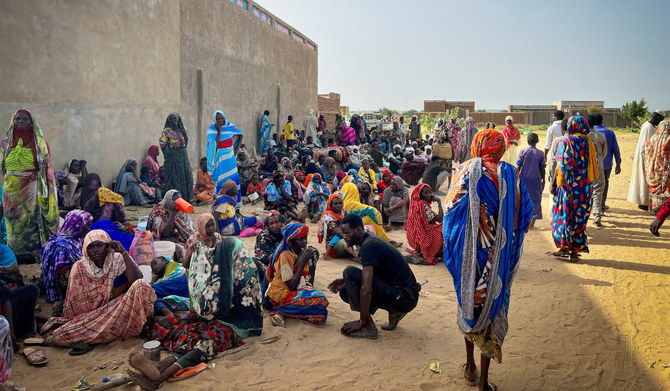CAIRO: A prominent rights group on Tuesday called for the International Criminal Court to investigate atrocities in Sudan’s volatile Darfur region, including what it says were “summary executions” of 28 non-Arab tribesmen by a Sudanese paramilitary force and allied Arab militias in May.
Human Rights Watch said several thousand members of the paramilitary Rapid Support Forces and their allies rampaged through the Darfur town of Misterei, home to the non-Arab Massalit tribe, on May 28.
The assailants killed the tribesmen and also left dozens of civilians dead or wounded, the New York-based watchdog said. The attack came as the paramilitary and Sudan’s army have been engaged in monthslong fighting that the United Nations says has brought Sudan to the brink of a full-scale civil war.
“The mass killings of civilians and total destruction of the town of Misterei demonstrates the need for a stronger international response to the widening conflict,” said Jean Baptiste Gallopin, senior crisis and conflict researcher at Human Rights Watch.
Human Rights Watch said the paramilitary force would not immediately comment on the group’s findings. HRW urged the ICC to investigate the attack on Misterei and others elsewhere in Darfur as part of its investigation into the region’s genocidal war in the early 2000s.
The Darfur conflict began when African tribes that had long complained of discrimination rebelled against the Khartoum government, which responded with a military campaign that the ICC later said amounted to genocide. State-backed Arab militias known as the Janjaweed were accused of widespread killings, rapes and other atrocities. The Janjaweed later evolved into the paramilitary Rapid Support Forces.
The fighting between the paramilitary and Sudan’s army erupted in mid-April, at first centered in the capital, Khartoum. Later, the clashes spread across Sudan, including in Darfur, which saw some of the fiercest battles.
According to Human Rights Watch, the paramilitary and allied Arab militias on motorcycles, pick-up trucks and horses surrounded Misterei and clashed with Massalit fighters. The assailants, armed with assault rifles, rocket-propelled grenades and vehicle-mounted machine guns, killed men in their homes, on the streets or in hiding.
HRW said they also looted property, stole livestock and valuables before burning the town to the ground. Thousands of residents, including women and children, fled as assailants fired on them, killing many more, the group said.
It quoted an unidentified 76-year-old man as saying the attackers fired on the fleeing people. “I saw three people running, being shot at, and falling to the ground near a grocery store,” he said.
The group said the attackers also went after those who were hiding in schools and a local mosque.
The rights groups said it documented the killing of at least 40 civilians. Local officials said 97 people were killed in the May 28 attack. At least 59 were buried in mass graves, HRW said.
Along with Misterei, six other West Darfur towns and villages were also burned down over a period of several weeks, according to satellite imagery and fire detection data analyzes. Geneina, the local capital in West Darfur, also suffered widespread and apparently deliberate fire damage, HRW said.
Also Tuesday, the UN food agency said residents were still fleeing the violence in Darfur and crossing into Chad, including more than 20,000 refugees who crossed into the Chadian border town of Adre in the last week alone.
That brought the number of people who fled the fighting to Chad to more than 230,000 refugees and 38,000 returnees since since mid-April, the World Food Program said in a statement. In total, the conflict displaced about 3 million people, including over 700,000 who crossed into Sudan’s neighboring countries, according to the UN figures.
The agency said many of the arrivals to Chad were seriously wounded amid reports that fleeing civilians are being deliberately targeted “with an increasing ethnic dimension to the violence.”
“People are running across the border, wounded, scared, with only their children in their hands and the clothes on their backs. They need safety, security, and humanitarian assistance,” said Pierre Honnorat, WFP’s country director in Chad.
Many of the arrivals have lost family members, and “we don’t even dare ask them, ‘Where are the men?’ The answer from the mothers is often that they were killed,” Honnorat said later during an online briefing.
Speaking from the Zabout refugee camp in the Chadian border town of Goz Beida, Honnorat said financial support is urgently required to meet the growing needs of the refugees including dangerously malnourished children. At least one in 10 displaced youngsters from Sudan is malnourished, according to the WFP.
“Every week children are dying at the nutrition centers, this is a reality,” Mr. Honnorat said, adding that the UN food agency needs at least $13 million every month to help those on the Chad-Sudan borders.

























